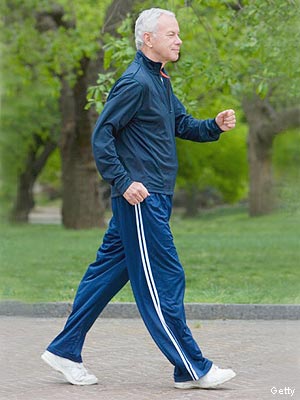A simple walking test could show if Alzheimer’s patients have the disease, say researchers after they found a link between the two.
In one test patients with a shorter stride and lower cadence and velocity in their walk also experienced memory problems and issues with cognition.
Another test found a person’s gait became “slower and more variable as cognition decline progressed”.
The findings are the first time that a physical symptom has been linked to the disease.
Previous research looked into cognition by carrying out neurological exams which tended to be costly and take a long time.

In future patients could simply be asked to walk and be observed over a number of months to see if they are at risk.
Crucially, the scientists said that walking changes can occur even before cognition decline surfaces.
Both pieces of research were presented at Alzheimer’s Association International Conference in Vancouver, Canada.
The first from the US-based Mayo Clinic involved monitoring how 1,341 participants walked through a gait sensor in two or more visits spaced 15 months apart.
The researchers found that walking changes occur because the disease interferes with the circuitry between areas of brain.
Lead researcher Rodolfo Savica said: “Walking and movements require a perfect and simultaneous integration of multiple areas of the brain.
“These changes support a possible role of gait changes as an early predictor of cognitive impairment.”
The second piece of research was carried out by Basel Mobility Center in Basel, Switzerland, and was on 1,153 adults with a mean age of 78.
The team found that people with Alzheimer’s walked more slowly than those with mild cognitive impairment.
They said that an annual test might help detect the disease early and that often relatives of Alzheimer’s patients comment on how badly a person is walking.
Bill Thies, chief medical and scientific officer for the US-based Alzheimer’s Association, said: “Monitoring deterioration and other changes in a person’s gait is ideal because it doesn’t require any expensive technology or take a lot of time to assess.”
Recent research into Alzheimer’s found that signs of dementia may appear 25 years before patients or their family sees any outward symptoms.
Scientists from Washington University School of Medicine in St Louis believe the brains and spines of those with the disease change in their 30s and 40s, several decades before memory loss and confusion sets in.
